| Srl | Item |
| 1 |
ID:
086760
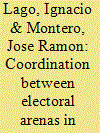

|
|
|
|
|
| Publication |
2009.
|
| Summary/Abstract |
This article shows the existence of a coordination dilemma in multilevel countries that hold elections for different parliaments, at different territorial levels and with different electoral rules. With evidence from Spain, the analysis identifies interaction or contamination effects between national and subnational electoral arenas that generate, just as in most mixed-member electoral systems, a centrifugal force that increases the number of electoral parties in national elections. The incentives that solve this coordination dilemma faced by small regional or local parties are theoretically discussed and empirically tested.
|
|
|
|
|
|
|
|
|
|
|
|
|
|
|
|
| 2 |
ID:
120132
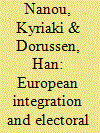

|
|
|
|
|
| Publication |
2013.
|
| Summary/Abstract |
The assignment of policy competencies to the European Union has reduced the divergence of party policy positions nationally, leaving the electorate with fewer policy options. Building upon insights from spatial proximity theories of party competition, the convergence argument predicts convergence particularly in policy domains with increasing EU competence. As the policy commitments that derive from EU membership increase, parties become more constrained in terms of the feasible policy alternative they can implement when in office. The analysis uses manifesto data at the country-party system level for nine policy domains. It uses ordinary least squares (OLS) estimation with country fixed effects, a lagged dependent variable and country corrected standard errors. Controlling for other factors that could plausibly explain policy convergence, the models also assess whether the convergent effect of party positions varies across different types of parties. The main finding is that in policy domains where the involvement of the EU has increased, the distance between parties' positions tends to decrease. The constraining impact of EU policy decisions differs between Member and non-Member States. This effect is more apparent for the policy agendas of larger, mainstream and pro-EU parties in the Member States.
|
|
|
|
|
|
|
|
|
|
|
|
|
|
|
|
| 3 |
ID:
137899
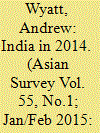

|
|
|
|
|
| Summary/Abstract |
The much anticipated general election produced a majority for the Bharatiya Janata Party under the leadership of Narendra Modi. The new administration is setting out an agenda for governing. The economy showed some signs of improvement, business confidence is returning, but economic growth has yet to return to earlier high levels.
|
|
|
|
|
|
|
|
|
|
|
|
|
|
|
|
| 4 |
ID:
133278
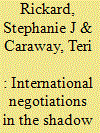

|
|
|
|
|
| Publication |
2014.
|
| Summary/Abstract |
This study examines the role elections play in negotiations between states and the International Monetary Fund (IMF). Although loans made by the IMF often require countries to introduce painful austerity measures that provoke a backlash from angry citizens, some governments are able to negotiate more favorable terms than others. Original data on the substantive content of IMF loans show that governments leverage imminent elections to obtain more lenient loan terms. Conditions that require labor market reforms in exchange for IMF financing are relatively less stringent in loans negotiated within six months before a pending democratic election, all else equal. The further away elections are from loan negotiations, the more stringent the labor conditions included in countries' loan programs. Elections give governments leverage in their international negotiations and this leverage is effective even when states negotiate with unelected bureaucrats during times of economic crisis.
|
|
|
|
|
|
|
|
|
|
|
|
|
|
|
|
| 5 |
ID:
179252
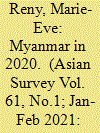

|
|
|
|
|
| Summary/Abstract |
The NLD was reelected in 2020 with more seats than it won in 2015. Myanmar’s transition is not regressing, but many priorities remain before the state truly democratizes: conducting transparent trials of military officers who were involved in the killings of Rohingyas, solving the conflict between the Arakan Army and the Tatmadaw in Rakhine State, ensuring that enduring armed conflicts do not undermine citizens’ ability to vote, making sure the National Ceasefire Agreement prevents the resurgence of old animosities, demilitarizing the constitution, and restraining the military’s ability to sue opposition for defamation.
|
|
|
|
|
|
|
|
|
|
|
|
|
|
|
|
| 6 |
ID:
101905
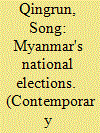

|
|
|
| 7 |
ID:
086674
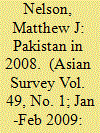

|
|
|
|
|
| Publication |
2009.
|
| Summary/Abstract |
Following the assassination of Benazir Bhutto in December 2007 and national elections in February 2008, Pakistan struggled to distance itself from the discredited military regime of President (General) Pervez Musharraf. Competition between the Pakistan People's Party (PPP), once led by Benazir Bhutto and subsequently by her widower Asif Ali Zardari, and the Pakistan Muslim League (PML-N) led by Nawaz Sharif, however, threatened to thwart the cause of political stability in Pakistan.
|
|
|
|
|
|
|
|
|
|
|
|
|
|
|
|
| 8 |
ID:
133659
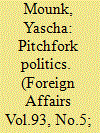

|
|
|
|
|
| Publication |
2014.
|
| Summary/Abstract |
The Tea Party and its European cousins have emerged from the enduring inability of democratic governments to satisfy their citizens' needs. Today's populist movements won't subside until the legitimate grievances driving them have been addressed.
|
|
|
|
|
|
|
|
|
|
|
|
|
|
|
|
| 9 |
|
| 10 |
ID:
104382
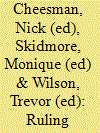

|
|
|
|
|
| Publication |
Singapore, ISEAS, 2010.
|
| Description |
vi, 353p.
|
| Standard Number |
9789814311465
|
|
|
|
|
|
|
|
|
|
|
|
Copies: C:1/I:0,R:0,Q:0
Circulation
| Accession# | Call# | Current Location | Status | Policy | Location |
| 055977 | 320.9591/CHE 055977 | Main | On Shelf | General | |
|
|
|
|
| 11 |
ID:
134095
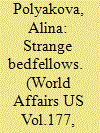

|
|
|
|
|
| Publication |
2014.
|
| Summary/Abstract |
The courtship between Eastern European far-right parties and Russia has been going on for years, of course. In 2008, Eastern Europe's far right supported the Russian war against Georgia. In May 2013, leaders of Jobbik, the Hungarian far-right party with dubious fascist origins, met with Russian Duma leaders and academics at Moscow State University. The neo-Nazi Bulgarian Ataka party has vocally supported Putin and Russian foreign policy. In 2012, Ataka's leader, Volen Siderov, traveled to Moscow, reportedly at his own expense, to celebrate Putin's sixtieth birthday and express admiration for the Russian president's strong leadership. After Russia's annexation of Crimea, Siderov threatened to withdraw his party's support from the coalition government if it supported further sanctions against Russia.
|
|
|
|
|
|
|
|
|
|
|
|
|
|
|
|
| 12 |
ID:
126078


|
|
|
| 13 |
ID:
133946
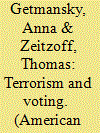

|
|
|
|
|
| Publication |
2014.
|
| Summary/Abstract |
How does the threat of becoming a victim of terrorism affect voting behavior? Localities in southern Israel have been exposed to rocket attacks from the Gaza Strip since 2001. Relying on variation across time and space in the range of rockets, we identify the effect of this threat on voting in Israeli elections. We first show that the evolution of the rockets' range leads to exogenous variation in the threat of terrorism. We then compare voting in national elections within and outside the rockets' range. Our results suggest that the right-wing vote share is 2 to 6 percentage points higher in localities that are within the range-a substantively significant effect. Unlike previous studies that explore the role of actual exposure to terrorism on political preferences and behavior, we show that the mere threat of an attack affects voting.
|
|
|
|
|
|
|
|
|
|
|
|
|
|
|
|